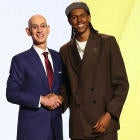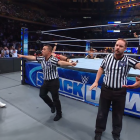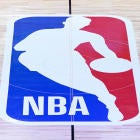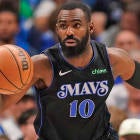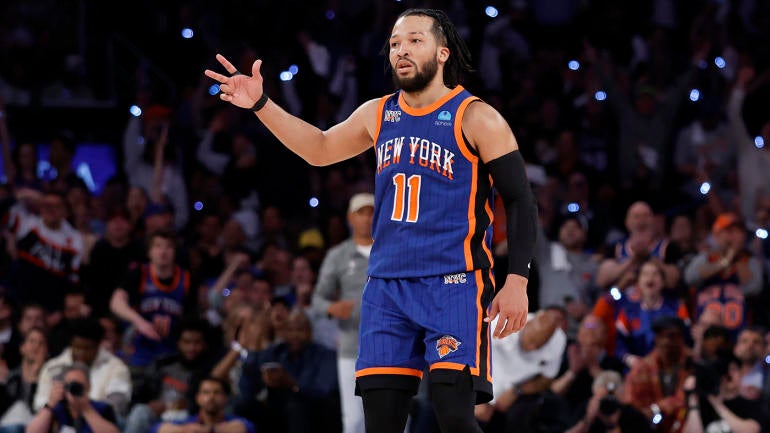
Jalen Brunson wanted to re-sign with the Dallas Mavericks in 2021. He was eligible for a four-year extension worth roughly $56 million, and as low as that figure seemed at the time, Brunson was risk-averse. "I want to be safe," Brunson said about his thought process at the time on All the Smoke. "I'm not trying to gamble right now. This is not something you really gamble with if it's out there." The Mavericks declined to offer Brunson such an extension. Now he's a New York Knick.
Three years later, a similar situation is playing out for Brunson, but in reverse. This time, his team is incredibly eager to re-sign him. Brunson has evolved into one of the NBA's best offensive players and the face of the Knicks. In all likelihood, he is going to remain in New York for the foreseeable future. It's only a matter of what sort of contract gets him there, and this time, it isn't clear that an extension is his best option.
NBA rules allow players like Brunson to sign a contract extension that starts at 40% above his previous salary and includes 8% raises annually. The issue for Brunson is that his current $107 million contract not only paid him less than he is now worth but actually descends in terms of annual salary. Brunson will make less next season than he did this season, and that also lowers the starting threshold on a possible veteran extension. If Brunson does extend this offseason, the most new money he could add to his deal would be roughly $156 million over four years. Under this arrangement, Brunson would decline his 2025-26 player-option, and his extension would kick in then. Here's what that deal would look like:
Year | Salary |
2025-26 | $34,944,001 |
2026-27 | $37,739,521 |
2027-28 | $40,535,041 |
2028-29 | $43,330,561 |
Total | $156,549,124 |
That's a lot of money. It doesn't come close to what Brunson is actually worth. There are already 34 players in line to earn more than Brunson would on this deal during the 2025-26 season, including Deandre Ayton, Michael Porter Jr. and Bradley Beal. That figure will climb as 2024 and 2025 free agents sign new deals of their own. Brunson was a Second-Team All-NBA player this season, suggesting he was one of this year's 10 brightest stars. If he signs this extension, he's not going to end it as one of the 50 highest-paid players in the league. He may not even start it as one of them.
So what's Brunson's alternative? If he waits a year, he can use his 2025-26 player option to become a free agent next offseason. He presumably wouldn't use this flexibility to leave the Knicks, but simply to make what he is worth. Free agents with full Bird Rights, as Brunson would be, are not limited in how much they can be paid by their incumbent teams. They can earn anything up to the max, a figure the Knicks would surely be happy to pay Brunson. We don't know exactly what that figure will be, but we can estimate. As a seven-year veteran, Brunson would be eligible to earn 30% of the salary cap. Next year's projected salary cap is $141 million. The widespread assumption is that the cap will rise 10% annually thereafter because of the new media rights contract. That would place the projected 2025-26 cap at $155.1 million. Were Brunson to sign for his max under those conditions, here is what his contract would look like:
Year | Salary |
2025-26 | $46,530,000 |
2026-27 | $50,252,400 |
2027-28 | $53,974,800 |
2028-29 | $57,697,200 |
2029-30 | $61,419,600 |
Total | $269,874,000 |
A $270 million deal sounds closer to Brunson's fair market value, doesn't it? All Brunson would have to do to get it is wait one extra year. That might sound like a no-brainer, but it isn't. Steve Popper reported that "all indications" suggest that Brunson is willing to take the $156 million now rather than wait a year for $270 million. So, why would he do that? There are a few reasons.
Security is the obvious one. As Brunson said about a possible extension in Dallas three years ago, "This is not something you really gamble with if it's out there." Brunson has a chance to secure generational wealth for his family by signing a contract that is available to him right now. Anything could happen if he waits a year. Sure, the Knicks would probably pay him anyway even if he got hurt next season, but you never know for certain. That is especially true for small guards.
Remember, a very similar situation played out for Isaiah Thomas in Boston. In 2016, he was the face of the Celtics. He joked that the team "better bring out the Brinks truck" to pay him. At that point, he was two years away from a new deal. He followed that quote up by finishing fifth in the 2016-17 MVP voting... but he also hurt his hip in the playoffs and then got traded to Cleveland for Kyrie Irving in the summer of 2017. By the time he reached free agency in 2018, the only contract he could find was for the minimum salary with the Denver Nuggets.
Even if smaller guards face the brunt of this risk, it's a threat to anyone, and some players are just more risk-averse than others. In that same 2021 offseason in which Brunson was trying to get an extension from the Mavericks, Julius Randle was in the position Brunson is now with the Knicks. He was coming off of a breakout season and was deciding between a seemingly below-market extension at the moment or free agency a year later. He chose the extension, a decision he's likely grateful for given how much he and the team struggled during the subsequent 2021-22 campaign.
Security would be the primary force behind an extension, but there's also an upside to consider here as well. If Brunson extends, assuming he gets a player-option in the final season of his deal, he could reach free agency again as soon as the summer of 2028. At that point, he would only be heading into his age-32 season, and theoretically primed for another sizable contract. If he waits until 2025 free agency, he'd be delaying his next free agency until the summer of 2029. He'd, therefore, be one year older at that point. Maybe he's worth big money at 33. Maybe he isn't. But in all likelihood, he's more valuable as a 32-year-old, so he'd be setting himself up to make some of this money up on the back end.
And then, of course, there are the benefits for the Knicks as a team. While New York is the NBA's biggest market and owner James Dolan has shown a willingness to pay the luxury tax in the past, the Knicks are about to get prohibitively expensive. Assuming the Knicks keep Bojan Bogdanovic's non-guaranteed deal, they already have roughly $135 million in salary committed for next season. That figure is going to jump significantly if they re-sign OG Anunoby and Isaiah Hartenstein. New York's best-case scenario if they run it back would probably be to pay the luxury tax, but come in under the projected first apron of $179 million. Doing so would allow them extra flexibility in trades and signings, but more likely, they fall somewhere between that figure and the $189 million second apron, which carries all sorts of restrictions when it comes to player additions.
Brunson's salary for next season is already locked in, but that just goes to show how expensive this roster is. It's only going to get pricier if the Knicks add another superstar, and because of all the new restrictions the second apron will introduce this season, every dollar Brunson saves the Knicks is worth several more when it comes to constructing a winning roster. The longer the Knicks can duck the second apron, the better. Having Brunson at a salary that is far below his actual value would go a long way for the Knicks in actually keeping this season's contending roster together and potentially improving it.
Brunson is already perhaps the most beloved Knick since Patrick Ewing. Even if he would mostly be doing it for long-term financial security, accepting a below-market value contract to stay in New York and help the Knicks continue to push for a championship would cement him as perhaps the city's most beloved modern public figure, athletic or otherwise. There's personal value to that, and there's probably financial value to it as well. Brunson is well on his way to becoming a New York icon. If he really does leave money on the table to stay there, it may just clinch his city-wide sainthood. Not a bad outcome for a player who, only three years ago, couldn't get the Mavericks to extend him for what is now basically mid-level money.
Looking for more NBA coverage? John Gonzalez, Bill Reiter, Ashley Nicole Moss and special guests dive deep into the league's biggest storylines daily on the Beyond the Arc podcast.










